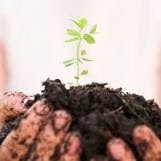Always we think in the future, but we forget to live each moment of our life and enjoy it. We forget to appreciate the small details to observe the expectation in something have not happened yet, so this circumstance create a state of uncertainty that not allows us to live fully. While we are thinking in the future, we lose time and do not develop our abilities to do our life extraordinary. We should remember the future is now, so we will take each time of the life to enhance and enrich our spirits. We will do anything to make us grow as professionals and as individuals because our actions represents indelible imprint we leave in this life. Making an extraordinary life requires courage and strong willpower to face any challenge until to get our goals. Two simple words like Carpe Diem reflects each step that we make to build our future, so we must do anything to build ours skills to get the desired future. Think in the future is like an act of guest, but we shape each step to achieve an exceptional life. Perseverance and discipline are the cues to advance in our projects because during our life we will face any type of problems, which represent an opportunity to defy our limitations. We will change some wrong habits in order to build an extraordinary life, so the frequently review of our actions help us get a good performance in the life.
viernes, 20 de mayo de 2011
viernes, 6 de mayo de 2011
Social Development through Organic Agriculture
There is a new tendency in the consumer demand about food that it was made by organic agriculture. The organic agriculture is the currently highlight point in the economy of several developing countries to implement their social growth. Producing food using the organic agriculture means that it helps to create jobs in the rural zones, build the social capital of rural areas, and maintain a healthy environment.
The organic agriculture is a new way to create diverse jobs in the local zones, especially in the rural areas around the world. First, there are a lot of people who live in the extreme poverty and remote locations, such as rural people. According to the Food and Agriculture Organization of the United Nations (FAO) (2006), “Three-quarters of the poor people in developing countries live in rural areas and most of them depend on agriculture for their livelihoods.” They usually don’t receive any kind of government support, so these people haven’t had government protection for long time. Consequently, they have devoted to growing drugs because they earn much money in this activity. While the governments don’t make any plan to create jobs in the rural areas, so the problem will be continued. Second, if the jobs don’t respect popular tradition in specific zones, it will cause a social conflict among rural people, government, and exporters. However, the organic agriculture is a good choice to generate jobs, so the governments should use this tool in their fight against poverty. As explained by the European commission (2006), “Organic works, a 2006 survey from the UK’s Soil Association, found organic farming in the UK provides 32% more jobs per farm than equivalent non-organic farms.” Third, the exports must be fair in the price that they pay to the farmers, so this the key in the relationship between exports and farmers.
Obama’s Organic Farming
Another important point of the organic agriculture is the availability to build the social capital in the rural areas. First of all, organic agriculture is made by traditional knowledge because farmers don’t use chemicals in the growing. Indeed, this is the core business in the ecological farming, and it helps for farmers to get a good price in the markets. Next, the social capital in the rural areas includes tools for inspection and control, like internal control and participatory guarantee systems that strengthen social organization and empower rural communities. Finally, while organic farming is a modern food production, its roots are founded in traditional agriculture and it still retains much of the knowledge gained from these systems, for example working with nature, using livestock manure as a fertilizer and growing only what the farm can naturally yield, providing suitable habitats around the farm for beneficial animals to help control pests naturally, and so on.
Ecological agriculture approaches the agriculture procedures with the health care in the environment. Now that the organic agriculture is the new tendency in the producing food, the farmers must be careful in their techniques. If they want to maintain the integrity of the ecosystem and productivity of natural resources, they won’t use chemicals synthetic, pesticides and synthetic fertilizer. Second, under the organic agriculture, the prevention is the clue, so farmers should apply their skills to prevent problems. Third, technology plus traditional background are the routes in which farmers should use to improve their production.
Organic agriculture’s opponents believe that this type of farming is not the good option in the fight against poverty because the rural farmers don’t have enough knowledge to mass production, so they think managing agriculture, especially big companies. In fact, organic farmers won’t buy synthetic seeds and others synthetic products to use in their crops. Furthermore, organic agriculture is an economic activity that doesn’t spend a lot of money during its growing, so rural farmers have a new way to develop their social and economy situation.
The social development through organic agriculture is only one of the strategies to fight against the poverty because it includes diverse tools like: create jobs in the rural zone, make the social capital and health care in the environment. In my opinion, developing countries should use this type of agriculture to increase their social relationship with their people because the rural people always don’t access to social programs that are implemented in their countries.






 6:27 p.m.
6:27 p.m.
 Mario Quispe Melgar
Mario Quispe Melgar



